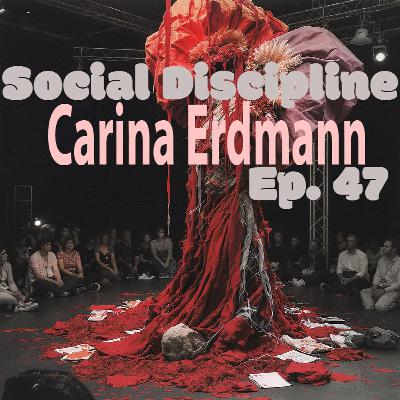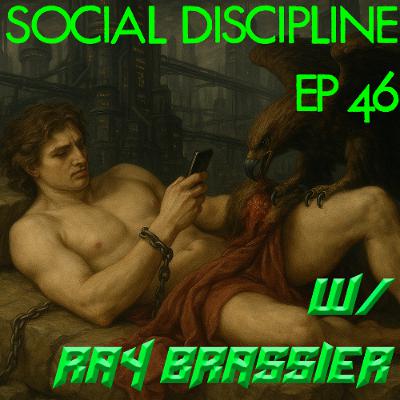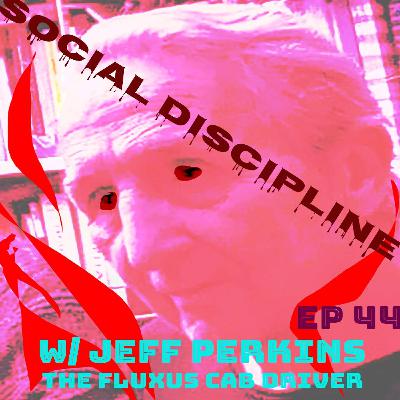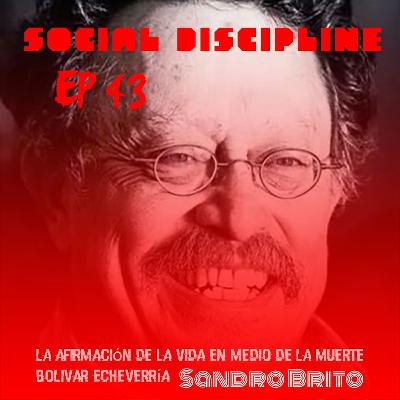Discover Social Discipline
Social Discipline

Social Discipline
Author: Social Discipline
Subscribed: 76Played: 633Subscribe
Share
© All rights reserved
Description
In the vast, unpredictable theater of now, Mattin and Miguel Prado surrendered to the whims of the unconscious, that masterful improviser, seeking to conjure into being a future that, once distant, now beckoned with the inevitability of a forgotten prophecy slowly, inexorably coming to fruition.
48 Episodes
Reverse
The Escalation of Struggles: Social Reproduction & Formal Subsumption
Alessandra Mezzadri discusses how formal subsumption can be understood through the diverse and rich perspectives of social reproduction, drawing in particular on the Italian Marxist Feminist tradition, to which the concept of the social factory owes a great deal.
Through a feminist reading of her fieldwork in India, and in dialogue with the work of Jairus Banaji, she shows how the Global South reveals the ways in which formal subsumption continues to function through multiple, heterogeneous forms of labour.
Rather than understanding these processes as producing paralysis and political powerlessness, she suggests that they may also open up new forms of antagonism, creating the conditions for the escalation of new struggles.
What can LARP teach us about pedagogy, community, and collective world-making? artist, researcher, curator and mentor in Game Design, Carina Erdmann joins Miguel Prado & Mattin to talk games as art, hacking everyday platforms, the politics of play, and why we might need to train our social muscles for futures that don’t yet exist. This conversation moves through conspiracy as collective thinking, the limits of empathy, and the careful work of attunement in collaborative play. Along the way, we touch on opacity and prefigurative practices, communal living experiments like the ones exercised at PAF, and what it means to rehearse for a revolution in these bleak conditions.
We’re incredibly honoured to be joined by Ray Brassier, a hugely formative thinker for both of us and one of the most important philosophers of the past 20 years. We talk about his upcoming book Fatelessness: Freedom and Fatality After Marx and, the contemporary condition of The Wretched of the Earth. Ray also gives an absolutely brilliant takedown of Nick Land and the speculative inhuman. Hope you enjoy it.
Mattin and Miguel Prado sit down with friend of the pod and fellow NRU member Inigo Wilkins to dive into Shitshow Theory — a work-in-progress text by Mattin and Inigo — and Miguel’s own take on what he calls Entropic Modernity.
Together we try to make sense of the neo-reactionary turn, Trump-era chaos, and the cultural meltdown we’re all living through. Theorising the shitshow, one glitch at a time.
Social Discipline is incredibly excited to present the adventurous life of Jeff Perkins, a hidden gem of the American underground.
This massive five-hour podcast, recorded in Berlin in June 2024, explores his fascinating journey—no one else can claim to have performed for Yoko Ono and John Cage, created legendary light shows with The Velvet Underground, Sly and the Family Stone, and The Germs, programmed the first Kenneth Anger retrospective in L.A., and encountered both Charles Manson and members of the satanic cult The Process.
Jeff joined the military in the 1960s and was stationed in Tokyo, where he met Yoko Ono in the early ’60s. He began performing some of her pieces there and later in New York. Perkins also filmed Ono’s classic Film No. 4 (Bottoms), a Fluxus work. His first independent contribution to the Fluxfilm Anthology was Shout. He was at the heart of the 1960s New York avant-garde scene, surrounded by figures like La Monte Young, Jack Smith, and Angus MacLise.
In January 1967, Perkins moved to Los Angeles, where he worked as a programmer at Cinematheque 16. Influenced by Tony Conrad’s The Flicker, he began producing powerful light shows and collaborated with bands throughout the ’60s and ’70s—ranging from The Jimi Hendrix Experience and The Grateful Dead to the punk scene with X and The Germs. He even refused to do a show for the Sex Pistols due to a disagreement with the promoter. Perkins was a close friend of Terry Jennings and, in fact, entrusted his archive to La Monte Young. While in L.A., he was neighbors with the artist James Turrell.
In 1980, Perkins moved back to New York and started a loft project just a block away from Ground Zero, reminiscent of George Maciunas’ artist loft spaces. To finance it, he worked as a cab driver. He remained deeply connected to cinema, particularly through Anthology Film Archives, where he proposed a John Cassavetes retrospective to Jonas Mekas and later became a manager. In 1994, Nam June Paik—who coined the term “The Fluxus cab driver” for Perkins—invited him to perform at Anthology Film Archives in a homage to Yoko Ono. His performance, Butthead, was a great success. His legendary loft became a hub where one could easily encounter visiting filmmakers like Pedro Costa and Albert Serra.
In 1989, Perkins organized a series of lectures at Anthology Film Archives with Henry Flynt and Tony Conrad, reuniting the two after years of estrangement. Flynt would become a lifelong friend. In 2008, during the financial crisis, when I lived with Jeff, we organized a series of four-hour lectures by Flynt in the loft’s kitchen, focusing on the crisis and communist economics. I vividly remember Tony Conrad attending one of them in his elegant pajamas.
Perkins has directed two critically acclaimed films—one on abstract painter Sam Francis and another on the legendary Fluxus figure George Maciunas. He is currently finishing editing a film about Henry Flynt in Berlin.
This podcast concludes with an excerpt from his piece Movies for the Blind, which features recordings of conversations with passengers from his time as a New York cab driver.
En este episodio, Sandro Brito, de la Cooperativa Cráter Invertido en Ciudad de México, nos introduce a la obra del marxista ecuatoriano Bolívar Echeverría y su biografía heterodoxa y fascinante. Como nos comenta Sandro, Echeverría, influenciado por el existencialismo de Unamuno, comenzó a interesarse en Sartre y Heidegger. Además, formó parte del grupo artístico Cortadores de Cabezas.
En 1961, viajó a Friburgo con la intención de conocer a Heidegger, pero este lo rechazó por no saber alemán. Entonces se trasladó a Berlín, donde acabó en la Freie Universität, donde conoció a Rudi Dutschke. En esos años, Berlín era un hervidero radical donde las lecturas del marxismo subterráneo de Korsch y Lukács se combinaban con talleres de lectura de El capital fuera de la universidad. Era la época de Dieter Kunzelmann, Kommune 1, Spur, Hans-Jürgen Krahl, Subversive Aktion y su publicación Anschlag.
En 1968, Echeverría llegó a Ciudad de México, un lugar de exilio para muchos radicales marxistas. En esos años, el marxismo en América Latina vivía un gran auge, con figuras como Óscar del Barco y José Aricó en Córdoba, Argentina. También destacaban casas editoriales como Siglo XXI, Casa de las Américas, Pensamiento Crítico, Biblioteca del Pensamiento Socialista y la Fundación Era. En 1974, comenzó la publicación de Cuadernos Políticos, donde Echeverría publicó sus primeros textos.
Hablamos también de su concepción de la enajenación y su interpretación del fetichismo de la mercancía, el trabajo y el valor de uso, y cómo estos pueden ser comprendidos más allá del capital. Acabamos con su concepción de la modernidad y lo que el llama ethos barroco.
Esta conversación tiene como trasfondo sonoro mezclas de Sandro, quien también es DJ como Emiliano Dietzgen.
Join us for an euphoric episode with our very good friends of the pod, Amy Ireland and Maya B. Kronic. Inspired by their work on Cute Accelerationism this episode explores the multiple dimensions of contemporary cuteness. From its sensory and cultural impacts to its erotic and semiotic layers, we unravel how Cute opens a gate to the transcendental process of acceleration itself.
Para el presente episodio, hemos tenido el privilegio de conversar con Manuel Borja-Villel, cuya dirección en el Museo Reina Sofía ha marcado un antes y un después en el enfoque museístico moderno. Hablamos de las constantes guerras culturales que enfrenta el arte contemporáneo, del concepto de Cora, discutimos su reciente participación en la Bienal de São Paulo y las audaces propuestas que presentó para Documenta.
In this episode of Social Discipline, we're joined by the renowned philosopher and complexity scientist, Alicia Juarrero. Alicia delves into the intricate world of causality in complex systems, offering insights from her seminal work, Dynamics in Action and Context Changes Everything. Throughout our conversation, she unpacks the principles of complexity and their implications for understanding human behavior and decision-making processes. We also explore how her theories challenge traditional views of causality and control in both social and natural sciences. Additionally, Alicia shares her thoughts on the ethical dimensions of complexity, particularly how they relate to issues of freedom and responsibility in contemporary society.
In this cultural biography from the incendiary and radical poet and thinker Howard Slater (Break/Flow), we speak about far-left culture in Britain since the 1970s and its relationship to politics and poetry. Slater started the legendary Break/Flow zine in the 90s and participated in the Virtual Future conference. In the 2000s, he began the eclectic label Difficult Fun with others. In the early 2010s, he was part of developing MayDay Rooms, a fantastic archive and resource for social movements and marginal cultures based in London. Slater is currently translating Jacques Camatte and working on his poetry. This podcast includes previously unreleased poetry from Slater.
In this episode, we speak with artist Marwa Arsanios about her practice, documenta fifteen, feminism, and the possibility of reshaping the political potential of art. She talks to us about her ongoing project, Who Is Afraid of Ideology?, which Arsanios did as part of documenta fifteen. In this project, she explores through collaboration the possibility of communizing land and its practical, legal, and geological connotations. Furthermore, we discuss the aftermath of documenta fifteen and its problems. We also get to know about the origins of the title and the ideological differences in regards to feminism in Beirut in the last decade.
Conversation with artist, writer and curator Hamja Ahsan on the support campaign he organized for his brother Syed Talha Ahsan, his groundbreaking book Shy Radicals, his project at documenta fifteen and the hate campaign that he is receiving from some of the German media. Hamja talks openly about mental heath issues, islamophobia and the crucial support that he got from Anne Tallentire while he was studying at Central Saint Martins.
Miguel Prado and fellow Guild navigator (and co-host for today's episode) Sonia de Jager meet Diana Walsh Pasulka: professor of philosophy and religion at UNCW and author of American Cosmic: UFOs, Religion, and Technology. We discuss what do we mean by agnostic when we want to be challenged by new knowledge, the UFO phenomena as a new form of religion, recent congress' public hearing into "unidentified aerial phenomena'', how ancient aliens could have handed technology to humanity and much more!
Cover image by NonayahBiz
https://www.reddit.com/r/singularity/comments/w92937/i_told_ai_starryai_to_show_me_the_moment_ancient/
We had the great pleasure of being joined by Jeffrey J. Kripal in conversation about how to lift the veil of Isis, the radical collapse of the subject-object structure, paranormal research, LaMBDA alleged consciousness, conspirituality, Esalen Institute and its impact on American culture and many other liminal topics.
Jeffrey Kripal is J. Newton Rayzor Chair in Philosophy and Religious Thought at Rice University and is the associate director of the Center for Theory and Research at the Esalen Institute in Big Sur, California. He is the author of eight books, including: The Flip: Epiphanies of Mind and the Future of Knowledge (2019), Authors of the Impossible: The Paranormal and the Sacred (2010) and Esalen: America and the Religion of No Religion (2007)–all mentioned in this episode.
Crypto collapse! Simply HODL and stay with us while we talk with Wassim Z. Alsindi: veteran of the timechain, founder and host of the 0x Salon, conducting experiments in post-disciplinary collective knowledge practices. Wassim specialises in conceptual design and philosophy of peer-to-peer systems. Today he guides us through the speculative hellscape.
Some resources:
(blockchain-time) Reminiscences of a Clock Operator
https://0xsalon.pubpub.org/pub/jmysxacr/
(nfts/digital art) The Revolution Will Not Be Tokenised
https://0xsalon.pubpub.org/pub/nl45krtx/
(bitcoin indeterminacy) Bitcointingency
https://weirdeconomies.com/contributions/bitcointingency
(on memes)
https://spectrumstore.com/en/memetic-counterculture-starter-pack
(on daos) DAOcolonisation 0x Salon Audio Report
https://0xsalon.pubpub.org/pub/fbeqr4q3/release/1?readingCollection=a777270b
Music by essential abstractions
This week, we had the great pleasure of being joined by Elvia Wilk, writer and editor, author of Oval (2019) and Death by Landscape, a collection of essays forthcoming this July from Soft Skull Press. We talked about her new book, the pandemic, plants, the weird, LARP, the Web 3.0 and post-nuclear religious fiction!!!
Errata corrige: 29:30 Yes, plants do release more oxygen than carbon dioxide 🙊
We had the great pleasure of being joined by Matana Roberts, multidisciplinary artist, saxophonist, composer, and sound adventurer. We talked about the unequal mental health toll of the pandemic, the healing power of live music, their Coin Coin work and many other things!
We are back with Brazilian philosophers Gabriel Tupinamba and J.P. Caron from Círculo de Estudos da Idéia e da Ideologia, an institution with the task of investigating the political thought and collective organizational practices called for by the return of the communist hypothesis. They give us a primer on the institution and their meta-structural organizational practices. 4 sound pieces made out of the CSII archive of recordings. One per individual. J.P. piece was composed and mixed by himself, text: Gabriel Tupinambá- Freeing thought from thinkers, mastered by Sanannda Acacia.
We are back with Pan Dajing. We talk her work(that we love!), about solitude, crypticism, intimate "connection at a distance" and many other digressions into the emotional core of our "spiritual fluid".
We welcome philosopher and social scientist Jason Ānanda Josephson Storm, author of The Invention of Religion in Japan (2012), The Myth of Disenchantment (2017) and Metamodernism (2021). Among many other things, we talk about his work, modernity and its alleged departure from the supernatural, Mark Zuckerberg completely misreading Snow Crash, and how philosophy help us to live a live that it is worth living.

























I'm a fan of this podcast, but the background music is a bit too loud in the mix. there's a tension with people speaking and the feature-rich music. the music isn't bad imo, it just massively distracts from the conversation.
no sé quién ha hecho la edición... pero debería dedicarse a irse a la mierda cada día de su vida